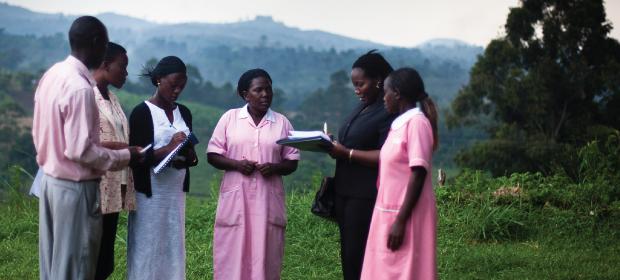Where We Work
See our interactive map


More than 30 Ugandans—among them doctors, nurses, health educators, and social workers—have gone to West Africa since August to join the effort to control the ongoing Ebola epidemic.
These Ugandan health workers have direct experience with such outbreaks. Over the last 15 years, Uganda has had four Ebola outbreaks (2000, 2007, 2011, and 2012). In each instance, the country’s health system was able to contain the outbreak to the initial site.Uganda was one of the first countries to adopt an integrated disease surveillance and response strategy, put in place laboratory networks, and develop local capacity for social mobilization during epidemics.
Now Ugandan health workers are working in shifts alongside their West African counterparts to provide around-the-clock care and maintain strict infection control measures.
At its core, this multipronged, long-term approach depends on health workers.
International health officials have acknowledged and tapped into Uganda’s experience in dealing with Ebola and other hemorrhagic diseases, yet the Western media has been slow to report on these contributions. Critical to Uganda’s past successes was a cadre of trained health workers who have expertise in managing infectious diseases. This workforce—developed over time—has been regularly reinforced with training that prepares them to identify infectious diseases, manage and control cases, and mobilize communities.Other pillars of Uganda’s effective epidemic response include:
Success requires local leaders who know what needs to be done.
With support from the US Centers for Disease Control and Prevention, Uganda also established an emergency operations center to provide timely data and maps during epidemics.At its core, this multipronged, long-term approach depends on health workers who are knowledgeable, ready to act quickly, and confident they are not putting their lives unnecessarily at risk. They need reasonable assurance that the health system is prioritizing their well-being, including by taking appropriate preventive measures to avoid exposure and by establishing procedures to deal with any workplace exposures that may occur.Since 2008, IntraHealth International, through the Uganda Capacity Program, has been working with the government of Uganda to address health worker vulnerability. We have focused on building capacity for:
The Guidelines for Occupational Safety and Health Including HIV in the Health Services Sector from Uganda could be easily replicated in other countries to prepare for outbreaks. These have been widely used throughout Uganda to train district and health facility teams, develop action plans for local occupational health and safety committees, and to coordinate preparedness and response.The basic formula is to put local infrastructure in place to regularly review local conditions, identify challenges, and coordinate any necessary surveillance and contact tracing. Success requires local leaders who know what needs to be done and are guided by experts at the national level—well before an outbreak occurs.
An effective epidemic response utilizes its health workers at all levels and in all local communities. Professionals must be trained and motivated to effectively protect the lives of the people they serve. Prevention of health worker infectious accidents and management of the effects of any exposure are essential to keeping health workers safe.
And these issues must be addressed before a possible epidemic, not after
.Learn how you can help stop Ebola. IntraHealth’s work through the Uganda Capacity Program was funded by the US Agency for International Development.
Also read:
Get the latest updates from the blog and eNews




